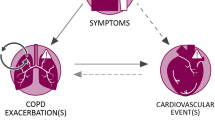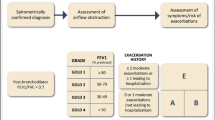Abstract
Background At this moment, there is no information in the literature showing the impact of comprehensive medication management (CMM) service delivered to patients with chronic obstructive pulmonary disease. Objective This study aims to present the clinical outcomes of this service provided to patients with chronic obstructive pulmonary disease. Settings Public specialty pharmacy where high cost drug treatments are provided for medical conditions not covered by the primary care such as COPD, located in Minas Gerais State, Brazil. Methods A retrospective analysis was conducted for 83 patients. The dependent variable in this study was the sum of the drug therapy problems detected during the first and second consultation. The independent variables were age, number of diseases and medications, diagnosis of hypertension, dyslipidemia and diabetes, and tabagism. Univariate and multivariate analyses were performed using Pearson’s Chisquare test. A level of significance of 5% was adopted for all analyses. Main outcomes Number, types and proportion of resolved drug therapy problems. Results Two hundred seventy seven drug therapy problems were identified, of which 53.1% were resolved. The most frequent drug therapy problem was the “use of unnecessary drug therapy” (n = 55; 19.8%). The identification of three or more drug therapy problem was higher among patients using five medications or more and among those using ten or more (p < 0.05). After the delivery of medication therapy management, the proportion of patients presenting “stable” clinical status was raised from 27 to 54% (p = 0.001). Conclusion CMM service demonstrates a positive impact on clinical outcomes of patients with chronic obstructive pulmonary disease and should prioritize patients with polypharmacy because they might have a higher number of drug therapy problems.
Similar content being viewed by others
References
Wiedenmayer K, Summers RS, Mackie Gous AGS, Everard M, Tromp D. Developing pharmacy practice: a focus on patient care. In: Handbook—2006 ed. Geneva: World Health Organization and International Pharmaceutical Federation; 2006. https://www.fip.org/files/fip/publications/DevelopingPharmacyPractice/DevelopingPharmacyPracticeEN.pdf.
Gurwitz JH, Field TS, Harrold LR, Rothschild J, Debellis K, Seger AC, et al. Incidence and preventability of adverse drug events among older persons in the ambulatory setting. JAMA. 2013;289:1107–16.
Ahmed B, Nanji K, Mujeeb R, Patel MJ. Effects of polypharmacy on adverse drug reactions among geriatric outpatients at a tertiary care hospital in Karachi: a prospective cohort study. PLoS ONE. 2014;9(11):e112133.
Johnson JA, Bootman JL. Drug-related morbidity and mortality and the economic impact of pharmaceutical care. Am J Health Syst Pharm. 1997;54(5):554–8.
Cipolle RJ, Strand LM, Morley PC. Pharmaceutical care practice: the patient centered to medication management. 3rd ed. New York: McGraw-Hill; 2012.
Ebbesen J, Buajordet I, Erikssen J, Brørs O, Hilberg T, Svaar H, et al. Drug-related deaths in a department of internal medicine. Arch Intern Med. 2001;161(19):2317–23.
World Health Organization. Police perspectives on medicine—promoting rational use of medicines: core components. 2002. http://www.who.int/medicines/publications/policyperspectives/ppm05en.pdf. Acessed 15 June 2016.
Brasil. Cuidado farmacêutico na atenção básica—serviços farmacêuticos na atenção básica à saúde—caderno 1. Brasília: Ministério da saúde, 2004. ISBN 978-85-334-2196-7.
Cipolle RJ, Strand LM, Morley PC. Pharmaceutical care practice: the clinician’s guide. 2nd ed. New York: McGraw-Hill; 2004.
Ramalho de Oliveira D. The reality of pharmaceutical care-based medication therapy management: patients’, pharmacists’ and students’ perspectives. Germany: Lambert Academic Publishing; 2010. ISBN 13: 978-3838317076.
Pan American Health Organization; World Health Organization (PAHO/OMS). Relatório 2001–2002: atenção farmacêutica no Brasil: trilhando caminhos. 2002. http://www.opas.org.br/medicamentos. Accessed 10 June 2016.
American Association of Colleges of Pharmacy. Pharmacists’ patient care process. Joint Commission of Pharmacy Practitioners. 2014. http://ww.accp.com/docs/positions/misc/JCPP_Pharmacists_Patient_Care_Process.pdf. Accessed Nov 2016.
McInnis T, Strand L, Webb E. The patient-centered medical home: integrating comprehensive medication management to optimize patient outcomes. 2nd ed. Washington: Patient-Centered Primary Care Collaborative; 2012.
Barnett MJ, Frank J, Wehring H, Newland B, VonMuenster S, Kumbera P, et al. Analysis of pharmacist-provided medication therapy management (MTM) services in community pharmacies over 7 years. J Manag Care Pharm. 2009;15(1):18–31.
Obreli-Neto PR, Marusic S, Guidoni CM, Baldoni Ade O, Renovato RD, Pilger D, et al. Economic evaluation of a pharmaceutical care program for elderly diabetic and hypertensive patients in primary health care: a 36-month randomized controlled clinical trial. J Manag Care Spec Pharm. 2005;21(1):66–75.
Welch EK, Delate T, Chester EA, Stubbings T. Assessment of the impact of medication therapy management delivered to home-based medicare beneficiaries. Ann Pharmacother. 2009;43(4):603–10.
Planas LG, Crosby KM, Mitchell KD, Farmer K. Evaluation of a hypertension medication therapy management program in patients with diabetes. J Am Pharm Assoc. 2003;49(2):164–70.
Mourão AOM, Ferreira WR, Martins MAP, Reis AM, Carrillo MR, Guimarães AG, et al. Pharmaceutical care program for type 2 diabetes patients in Brazil: a randomised controlled trial. Int J Clin Pharm. 2013;35(1):79–86.
Strand LM, Cipolle RJ, Morley PC, Frakes MJ. The impact of pharmaceutical care practice on the practitioner and the patient in the ambulatory practice setting: twenty-five years of experience. Curr Pharm Des. 2004;10(31):3987–4001.
Schultz H, Westberg SW, Ramalho de Oliveira D, Brummel A. Patient-perceived value of medication therapy management (MTM) services: a series of focus groups. Innov Pharm. 2012;3(4):1–8.
Garrett DG, Martin LA. The asheville project: participants’ perceptions of factors contributing to the success of a patient self management diabetes program. J Am Pharm Assoc. 2003;43(2):185–90.
World Health Organization. Burden of COPD. Geneva: WHO; 2014. http://www.who.int/respiratory/copd/burden/en/. Accessed 15 June 2016.
World Health Organization. Package of essential noncommunicable (PEN) disease interventions for primary health care in low-resource settings. Geneva: WHO; 2010. ISBN 978-92-4-159899-6. http://www.who.int/nmh/publications/essential_ncd_interventions_lr_settings.pdf. Accessed 15 June 2016.
Bryant J, McDonald VM, Boyes A, Sanson-Fisher R, Paul C, Melville J. Improving medication adherence in chronic obstructive pulmonary disease: a systematic review. Respir Res. 2013;14:109.
Fuller L, Conrad WF, Heaton PC, Panos R, Eschenbacher W, Frede SM. Pharmacist-managed chronic obstructive pulmonary disease screening in a community setting. J Am Pharm Assoc. 2003;52(5):59–66.
Wei L, Yang X, Li J, Liu L, Luo H, Zheng Z, et al. Effect of Pharmaceutical care on medication adherence and hospital admission in patients with chronic obstructive pulmonary disease (COPD): a randomized controlled study. J Thorac Dis. 2014;6(6):656–62.
Jarab A, AlQudah SG, Khdour M, Shamssain M, Mukattash TL. Impact of pharmaceutical care on health outcomes in patients with COPD. Int J Clin Pharm. 2012;34(1):53–62.
Khdour MR, Kidney JC, Smyth BM, McElnay JC. Clinical pharmacy-led disease and medicine management programme for patients with COPD. Br J Clin Pharmacol. 2009;68(4):588–98.
Brasil. Ministério da Saúde. Portaria no 1.554, de 30 de julho de 2013. Dispõe sobre as regras de financiamento e execução do Componente Especializado da Assistência Farmacêutica no âmbito do Sistema Único de Saúde (SUS). http://bvsms.saude.gov.br/bvs/saudelegis/gm/2013/prt1554_30_07_2013. Accessed 15 June 2016.
Jyrkkä J, Enlund H, Korhonen MJ, Sulkava R, Hartikainen S. Patterns of drug use and factors associated with polypharmacy and excessive polypharmacy in elderly persons: results of the Kuopio 75+ study: a cross-sectional analysis. Drugs Aging. 2009;26(6):493–503.
Isetts BJ, Brown LM, Schondelmeyer SW, Lenarz LA. Quality assessment of a collaborative approach for decreasing drug-related morbidity and achieving therapeutic goals. Arch Intern Med. 2003;163(15):1813–20.
Mahler DA, Wells CK. Evaluations of clinical methods for rating dyspnea. Chest J. 1988;93(3):580–6.
Zhong H, Ni XJ, Cui M, Liu XY. Evaluation of pharmacist care for patients with chronic obstructive pulmonary disease: a systematic review and meta-analysis. Int J Clin Pharm. 2014;36(6):1230–40.
Wright D, Twigg M, Barton G, Thornley T, Kerr C. An evaluation of a multi-site community pharmacy-based chronic obstructive pulmonary disease support service. Int J Pharm Pract. 2015;23(1):36–43.
Tommelein E, Mehuys E, Van Hees T, Adriaens E, Van Bortel L, Christiaens T, et al. Effectiveness of pharmaceutical care for patients with chronic obstructive pulmonary disease (PHARMACOP): a randomized controlled trial. Br J Clin Pharmacol. 2014;77(5):756–66.
Ottenbros S, Teichert M, de Groot R, Griens F, Sodihardjo F, Wensing M, et al. Pharmacist-led intervention study to improve drug therapy in asthma and COPD patients. Int J Clin Pharm. 2014;36(2):336–44.
Maher RL, Hanlon JT, Hajjar ER. Clinical consequences of polypharmacy in elderly. Expert Opin Drug Saf. 2014;13(1):57–65.
Patterson SM, Hughes C, Kerse N, Cardwell CR, Bradley MC. Interventions to improve the appropriate use of polypharmacy for older people. Cochrane Database Syst Rev. 2012;(5):CD008165. In: The Cochrane Library doi: 10.1002/14651858.CD008165.pub2.
Ramalho de Oliveira D, Brummel AR, Miller DB. Medication therapy management: 10 years of experience in a large integrated health care system. J Manag Care Pharm. 2010;16(3):185–95.
Rao D, Gilbert A, Strand LM, Cipolle RJ. Drug therapy problems found in ambulatory patient populations in Minnesota and South Australia. Pharm World Sci. 2007;29(6):647–54.
McInnis T. Medication underuse: the most underappreciated quality-of-care gap. 2015. http://www.pharmacytimes.com/publications/directions-in-pharmacy/2015/march2015/medication-underuse-the-most-underappreciated-quality-of-care-gap. Acessed 15 Nov 2016.
Festic E, Scanlon PD. Incident pneumonia and mortality in patients with chronic obstructive pulmonary disease. A double effect of inhaled corticosteroids? Am J Respir Crit Care Med. 2015;191(2):141–8.
Cutler D, Everett W. Thinking outside the pillbox—medication adherence as a priority for health care reform. N Engl J Med. 2010;362(17):1553–5.
Perera PN, Guy MC, Sweaney AM, Boesen KP. Evaluation of prescriber responses to pharmacist recommendations communicated by fax in a medication therapy management program (MTMP). J Manag Care Pharm. 2011;17(5):345–54.
Acknowledgements
The authors wish to acknowledge Pedro Ramos Barbosa, medical student, St. George’s University of London, for his technical contribution on language editing and also Verlanda Lima Bontempo and Patrícia de Oliveira, Specialty Pharmacy managers, Belo Horizonte, Minas Gerais, Brazil, for their administrative support.
Funding
This research received no specific grant from any funding agency in the public, commercial, or not-for-profit sectors.
Author information
Authors and Affiliations
Corresponding author
Ethics declarations
Conflicts of interest
The authors have no potential conflict of interest.
Rights and permissions
About this article
Cite this article
Detoni, K.B., Oliveira, I.V., Nascimento, M.M.G. et al. Impact of a medication therapy management service on the clinical status of patients with chronic obstructive pulmonary disease. Int J Clin Pharm 39, 95–103 (2017). https://doi.org/10.1007/s11096-016-0402-6
Received:
Accepted:
Published:
Issue Date:
DOI: https://doi.org/10.1007/s11096-016-0402-6




